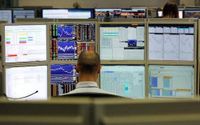The financial markets are currently in turmoil, grappling with the implications of newly announced tariffs by the United States, which have sent shockwaves through global economies. On April 4, 2025, Wall Street suffered a staggering loss of $2 trillion, while European markets saw a decline of €422 billion in response to the tariff storm. This has raised fears of a potential global recession, with Asian markets also closing heavily in the wake of these developments.
In Italy, the FTSE MIB index in Milan has been particularly hard hit, dropping to -4% as banks face significant challenges. The downturn was exacerbated by the announcement from U.S. President Donald Trump, who indicated that tariffs would also soon be applied to pharmaceuticals and semiconductor chips. Despite the market chaos and criticism from various world leaders, Trump remains steadfast, urging investors and citizens to place their trust in his administration.
Italian Prime Minister Giorgia Meloni has described the U.S. tariffs as a "mistake, but not a catastrophe." She emphasized the need for Italy to engage in dialogue with the U.S. regarding these tariffs, stating, "I believe that this is what needs to be done for our interest, for the interest of our economy, for the interest of Europe, and for the interest of the West." Meloni is scheduled to meet with industry representatives next week to discuss the tariffs' impact sector by sector, aiming to find collaborative solutions to mitigate the effects.
As the situation unfolds, Meloni has suggested the possibility of suspending the Green Deal regulations concerning the automotive sector, which has been adversely affected by the tariffs. She expressed concern but cautioned against alarmism, noting that the U.S. market accounts for approximately 10% of Italian exports. "We will not stop exporting to the U.S., but we must be careful of the panic that I am seeing in these hours," she stated.
The European stock markets are currently undergoing their worst week since 2022, with the Stoxx 600 index down 2%, reflecting a 5% decline for the week. Major European banks have suffered significant losses, with Banco Sabadel down 9%, Societe Generale down 8%, and Deutsche Bank down 7.6%. In Piazza Affari, MPS and Unicredit have also seen substantial declines of 8.4%.
In the energy sector, oil prices have taken a hit as well, with WTI crude falling 3.7% to $64.50 per barrel and Brent crude down 3.4% to $67.77. Natural gas prices in Amsterdam have also decreased, dropping 3.1% to €37.97 per megawatt hour. The automotive sector is feeling the strain, with companies like Renault, Volkswagen, and Stellantis reporting declines in their stock prices.
The Financial Times has characterized Trump's tariff strategy as "one of the greatest acts of self-harm in American economic history," warning that it could cause incalculable damage to families, businesses, and financial markets globally. An analysis from The European House Ambrosetti estimates that the tariffs could result in customs costs exceeding €100 billion for the European Union, with Germany and Italy being particularly affected.
In response to the escalating situation, European leaders are calling for unity. French President Emmanuel Macron emphasized the strength of the EU's 450 million consumers, urging a collective response to protect against U.S. tariffs. Meanwhile, Spain's Economy Minister, Carlos Cuerpo, noted that while it is too early to determine the full impact of the tariffs, they are likely to lead to general impoverishment.
As the economic landscape shifts, the Australian government has opted not to impose counter-tariffs but instead is pursuing free trade agreements with the EU and protecting its exporting businesses. In contrast, the Italian government is preparing to propose a revision of the Stability Pact to the EU in light of the economic challenges posed by the tariffs.
Despite the doom and gloom surrounding the tariffs, some market analysts remain cautiously optimistic. JD Vance, the U.S. Vice President, remarked that the market reaction could have been worse and predicted a lasting boom for the stock market as investments are reinvigorated within the U.S.
As the situation develops, the focus remains on potential negotiations between the U.S. and the EU. The EU's Trade Commissioner, Maros Sefcovic, has announced a video call with U.S. counterparts to explore ways to resolve the tariff dispute. The EU is prepared to take action if an equitable agreement cannot be reached, with Ursula von der Leyen stating that Europe must prepare for the inevitable impact of the tariffs.
In the meantime, the Italian government is responding to the crisis by convening a roundtable with industry representatives to address the concerns of small businesses and the risks posed by the tariffs. According to a survey conducted by Conflavoro, a significant number of small and medium enterprises (SMEs) in Italy are at risk of closure due to the economic fallout from the tariffs.
As the global economic landscape continues to evolve in the wake of these tariffs, the long-term implications remain uncertain. Investors and leaders alike are watching closely, hoping for a resolution that will stabilize markets and protect economies worldwide.









